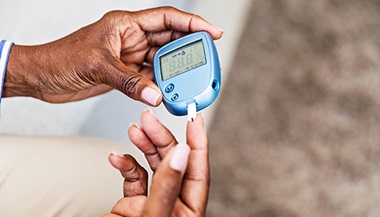Foot Ulcers
Protecting your feet
Have you given much thought to your shoes? If you have diabetes, it's especially important to wear properly fitting shoes, both inside and outside your home.
People with diabetes are more likely to have poor circulation to their feet and legs, in addition to nerve damage. As a result, they’re prone to developing sores, or ulcers, on their feet. These ulcers can get infected and take a long time to heal. In severe cases, the entire foot must be amputated to prevent widespread infection in the rest of the body.
Why are shoes so important?
About a quarter of all people with diabetes will develop an infected, difficult-to-treat wound known as a foot ulcer at some point in their lives. These wounds often start out small but can quickly turn into a big deal. Diabetic foot ulcers are the leading cause of foot amputations.
Properly fitting shoes are the number one way to prevent blisters or scrapes, which can quickly turn into infected foot ulcers.
Always wear shoes!
-
Avoid flip-flops, high heels, stiff dress shoes and open-toed shoes.
-
Choose shoes that have plenty of toe room, a smooth inner lining and a sole thick enough to prevent a puncture wound if you step on a tack or nail, for example.
-
Always wear socks to prevent blisters.
-
If your feet are different sizes, or if you have a malformed foot, a podiatrist can create custom-made shoes to fit your feet.
What should I watch for?
Take a moment each day to look at your feet. Find a well-lit area, perhaps under a lamp or in the bathroom, and look closely at your entire foot — especially the tips of your toes and the bottoms of your feet. If you aren't able to see your feet, ask a family member or caretaker to check them for you.
If you notice a callous, blister, drainage on your sock, an area of redness or a patch of skin that remains warmer than the surrounding areas long after you've removed your shoes, contact your doctor. Your doctor may clean the wound, remove any dead tissue, apply a clean bandage, treat any infection and advise you to stay off of your foot as long as possible. Left untreated, foot ulcers are a leading cause of foot amputations in people with diabetes.
Are you at risk for a foot ulcer?
-
Do you have a foot deformity? If so, you may have a higher than average risk of a foot ulcer.
-
Do your shoes rub the wrong way? Poorly fitting shoes are a leading cause of foot ulcers.
-
Can you feel your feet? Diabetes can cause nerve damage to the feet, making it difficult to feel cuts or scratches.
-
Do you have high blood pressure? You may not realize it, but controlling your blood pressure could actually help protect your feet as well as your heart.
-
Have you had a foot ulcer before? If so, you’re at higher risk of having another one. Check your feet daily and call your doctor at the first sign of an injury.
-
Do you go barefoot? Wearing shoes — both inside and outside — can help protect your feet from injury.
-
Can you see your feet? People who are overweight or have diabetic eye disease should ask a family member or caretaker to examine their feet every day.
-
Do you smoke? Ask your doctor for help quitting. Your feet will thank you.






